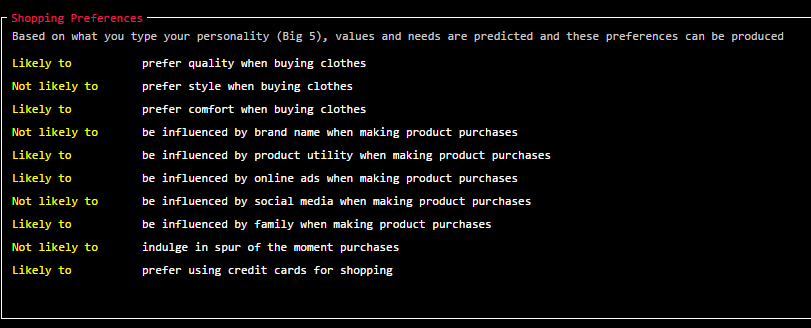10 Second Takeaway: Google uncovered a major data problem with a popular software program and is helping that company work now to protect data, but you should change important passwords. We also show how companies like Facebook and Google decide what type of consumer you are. And we have news about Google My Business and a recently announced rules change for organizations with virtual offices.
Spotlight on Facebook Data
I have been testing a new browser extension called DATA SELFIE for the past several weeks. The program records your Facebook data activity to your hard drive and then begins using formulas to determine your likes, dislikes, and to project your buying habits.
The shopping section of the program is pictured above. Based on my comments, what I’ve posted, and my friends, the system determined that I prefer quality while buying clothes but am “not likely to be influenced by style when buying clothes”. After you’re done chuckling you can read some of the other observations.
Data Selfie won’t mimic Facebook or Google’s algorithms that determine behavior, but they operate in similar ways. The company promises that the Facebook data that it captures is only stored on your hard drive. I’ve verified that the data is there and will take the researchers at their word about not keeping a copy.
More Information:
Download Data Selfie for Chrome
Our Take: Organizations and consumers should understand that advertising analysis like this is what makes so much of the Internet free. And the algorithms will get better over time. What’s fascinated us is that I went back through my posts and had NO interactions about clothing at all. That’s the predictive nature of analytics today and something you or your agency should understand.
Spotlight on Privacy & the Cloudbleed Breach
A new style of data breach has happened–seemingly by accident–that has data scientists worried about the number of people potentially affected.
The problem is dubbed Cloudbleed because it originated from online properties using software to speed up their sites called Cloudflare. Researchers discovered last week that Cloudflare was “leaking” information from those sites to search engines. Passwords and private messages were among the data that Cloudflare allowed search engines to index.
Researchers say that there is nothing to do now except to change your most important passwords on banking, email, and other important applications. The major search engines are working now to remove the data that was captured from sites such as Yelp, OK! Cupid, Uber, and Fitbit.
Read more:Popular Mechanics, GitHub list of sites using Cloudflare, Gizmodo
Our Take: There really isn’t anything to do here because everything has already happened. Google scientist Tavis Ormandy discovered the problem and ensured that nothing was made public until the software company was aware. You really should be using password management software such as LastPass or Dashlane, especially for your important accounts. Using two-factor authentication–when you’re prompted to enter a code texted to you helps even more.
Spotlight on Google My Business
As Google personalizes search, the program called Google My Business becomes increasingly important.
This week Google announced changes to the way that organizations providing services to homes or offices should reflect their address in the listings.
The good news for businesses that deliver to customers and use virtual (closed to the public) offices is that service areas now exist.
Silver Beacon is one of Google’s certified partners in this program so talk with us if your organization needs help in Getting Your Business Online (GYBO) or ensuring that your Google Maps listings are accurate.
Image of shopping patterns from Data Selfie session, image of “Keep Out” sign courtesy Melodi Ustenor, image of Google logo courtesy Google.


